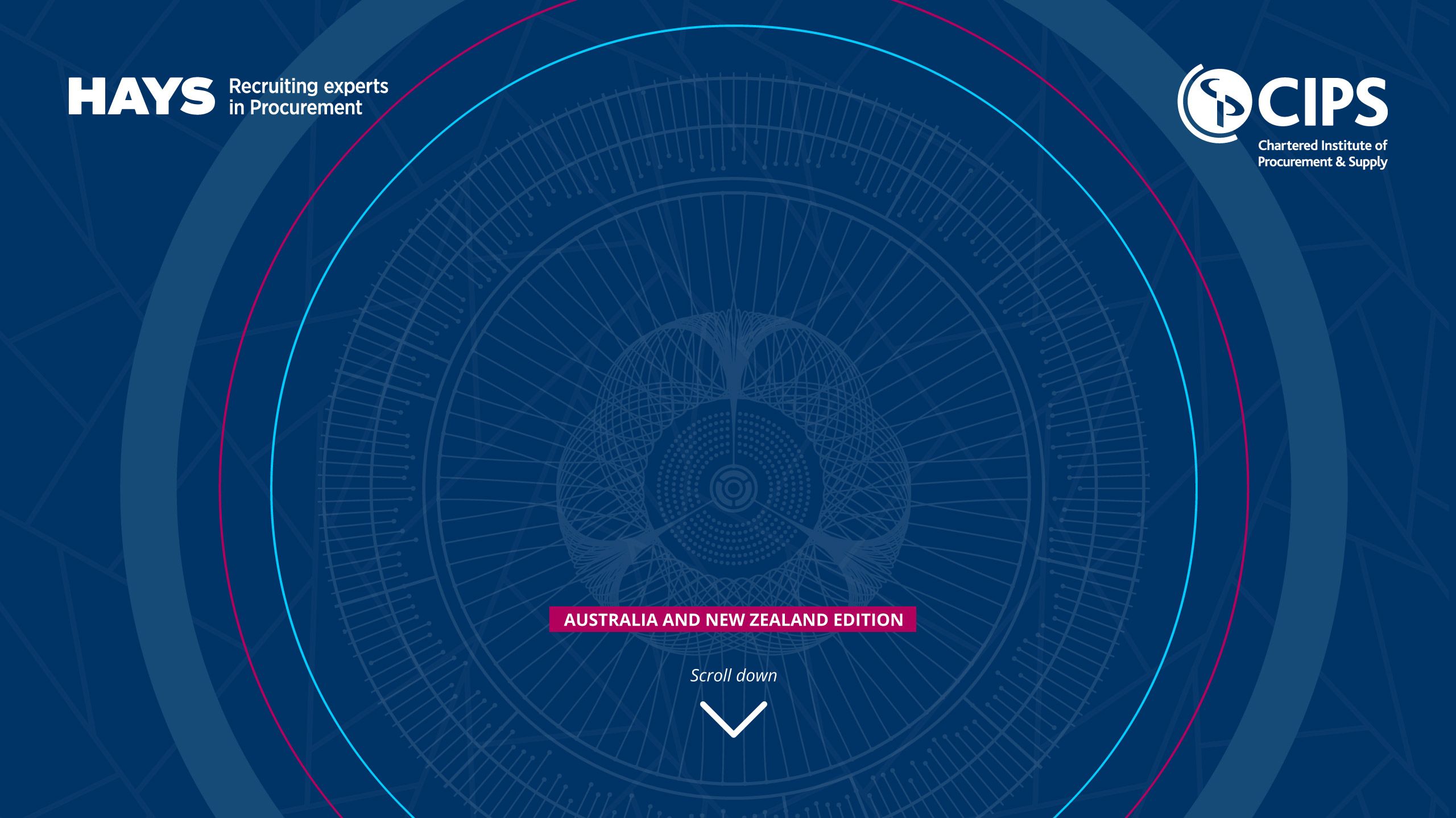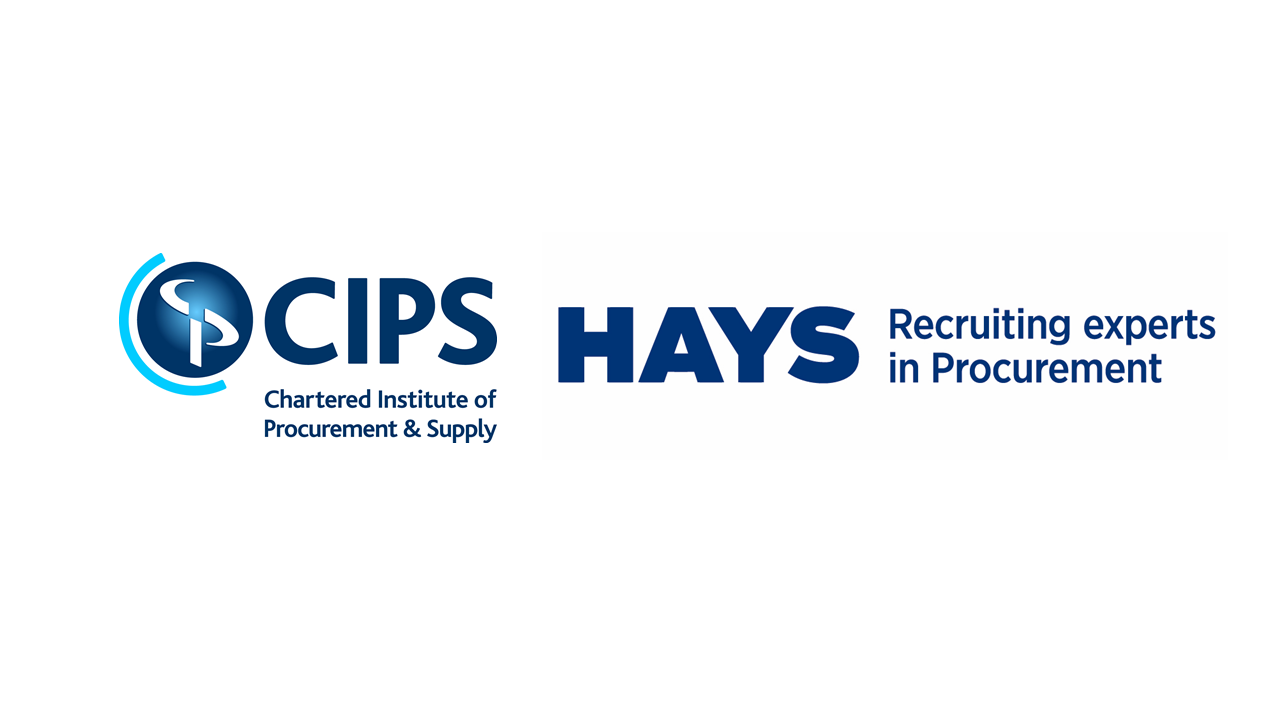2021
Procurement Salary
Guide and Insights
The Highlights

"Boards and CEOs are sitting up and taking notice of talented individuals. The CIPS/Hays Salary Guide clearly shows that professionals with the right experience and capabilities will be sought out and rewarded leading to varied and interesting careers for decades to come."
Malcolm Harrison
Group CEO, Chartered Institute of Procurement & Supply

Procurement: Perceptions,
Challenges, Skills and Opportunities
70%
believe that Directors and Heads of other departments
understand what procurement specialists can offer


COVID-19 has had a significant impact on the procurement profession. As is the case for many professions, we’ve had to change and adapt to new circumstances and ways of working, which presents both challenges and opportunities to bring in positive changes.
Soft skills have proved vital in managing unpredictable supply chains. As demands on procurement professionals have continued to evolve, so have the associated skills needed to succeed in the role. As with last year, soft skills continue to dominate the top skills in demand across all sectors, with internal stakeholder management coming out top this year. At a time when procurement specialists are relied upon more than ever, internal stakeholder management is crucial in order to continue raising the profile of the procurement function through effective communication.

Many of us have transitioned to a remote working environment and we’ve needed to adapt our communication styles accordingly. Arguably, strong communication skills result in better performance across all soft skills: good communicators are better able to lead, influence, and manage stakeholders and suppliers. This suggests that a focus on training individuals in this vital skill is likely to be a significant boost to any procurement team.
With the events of the last year, the procurement profession, like many others has faced significant challenges. Managing risk in the supply chain is always an important part of the procurement role, but even more so over the last 12 months. Whilst risk mitigation should always be a key focus for procurement and supply, it’s become more important than ever to proactively manage and mitigate risks across supply chains due to changing demands and disruptions.


Salaries, Bonuses and Benefits
AUS $140,636
average salary for
procurement professionals in Australia
NZD $130,427
average salary for
procurement professionals in New Zealand
5.5%
average pay rise received in
procurement across the region



Despite the challenges of the last year, employers are rewarding procurement professionals with salary increases above the national average rate.
Half of procurement professionals in Australia and New Zealand received a pay rise last year. On average, they earned a 5.5% salary increase, compared to the national average of 1.4% in Australia and 1.6% in New Zealand. This is a great sign of the procurement function's increasing status and value across sectors and industries.
The importance of studying towards and showing commitment to qualify for MCIPS is evident again this year. One in three employers would request MCIPS (or studying towards) as a preference for candidates and just under half would give further consideration to candidates with FCIPS. Those achieving MCIPS and FCIPS status are able to demand greater remuneration for their dedication to the profession, with a 20% average salary disparity across the region.

The benefits of MCIPS designation extend to bonuses, with a higher eligibility for receiving a bonus, as well as the receipt of larger bonuses than their Non-MCIPS counterparts. It’s clear to see the benefits of achieving this qualification, from both a remuneration perspective, but also wider value and respect within the profession.

On average, those who received a bonus were awarded an average of 10.6% of their salary, with the percentage increasing with seniority.
Although the vast majority found that their bonus was set by their organisation's commercial performance, they would have preferred for it to have been linked to their own personal targets. Just over a third would also have liked for performance against their team's targets to be taken into account - a reflection of the importance of collaboration and teamwork in the past year.

Many of us have benefited from more flexible working practices in the last 12 months. Whether it’s flexibility in choosing where to work or when, procurement professionals now have more freedom and an improved work-life balance.
Given the move away from traditional office environments, a higher proportion of procurement professionals found themselves benefiting from home working and flexible working hours than actively sought out these benefits. Now that these benefits have become the norm, employees will start looking for other indicators of flexibility beyond home working, such as compressed hours and flexible timetables.
This extends into wider benefit packages, and flexible and home working can no longer be considered merely ‘desirable’. There is a need to ensure benefit packages meet employee needs, as currently, in most cases, availability exceeds desirability. For example, both a Work Mobile Phone and Long Service Award are identified as being considerably more likely to be offered than desired. Careful consideration should be given to the packages offered and investment should be focused on those areas that are most likely to appeal to employees and keep them engaged as well as attract new talent.






Talent Management
34%
request MCIPS
(or studying towards) when hiring
37%
stated lack of technical skills/evidence
of formal procurement training as a
main challenge when hiring


As always, attracting the best talent is about more than just an industry-beating salary.
Salary is one of the leading motivators when it comes to securing a new job, but the last year has reshaped expectations of what the ideal job in procurement looks like. Employers need to recognise changing mindsets around the role of work and reflect these changing priorities in their hiring practices. Employees are looking beyond salaries and financial benefits to initiatives that will support their wellbeing and help them maintain a healthy work-life balance.

In a year where we’ve seen huge changes in the workplace, there is still a struggle to find the right talent. 53% say they have struggled to find the right talent in the last 12 months, driven by candidate salary expectations and a lack of sector skills and experience which is reflected in the lower levels of employee movement we have seen in the past year.
However, despite this increased caution, there is still an openness to new opportunities, and one of the prime motivations for seeking a new role is career advancement. 72% of procurement professionals are seeking a more senior procurement role in the next two years, which highlights the need to offer clear progression paths in order to retain the best talent. If it’s unclear how they would be promoted internally, they are likely to be drawn to external opportunities.
When looking for a new role, candidates will research the company and look to understand what the company offers and its reputation, its diversity and inclusion policies and training and investment opportunities, as well as working practices and any flexible working policies that may be in place. Procurement professionals primarily look for information about the content of the work and the management team as well as flexible working policies within the company when looking to move.

Conversely, 34% of those not looking for a new role say they don’t wish to move as they want to retain their current work-life balance.
With the pandemic impacting every area of our lives, maintaining a good work-life balance is more important now than ever and is a key reason not to pursue a more senior role or look to switch jobs. Informal flexible working and flexi-time are also important to employees, giving them flexibility to fit work around their home life.
In order to attract and retain talent from diverse groups, it’s important for organisations to consider their approach to flexible working, ensuring that it’s in step with employee expectations and changing market norms. Given the close link to employee retention, it’s likely that introducing a market-leading flexible working proposition will be well worth the effort and investment.



"The shift to remote working has provided organisations with the unique opportunity to demonstrate a great deal more flexibility... that welcomes and supports a wealth of different personal circumstances.”
Yvonne Smyth
Group Head of Equality, Diversity & Inclusion, Hays

Equality Diversity and Inclusion
(ED&I) in the Workplace
91%
agree that a diverse and
inclusive culture makes for
a more attractive workplace
75%
agree that their organisation
is committed to developing
a diverse and inclusive team


One of the many things that the pandemic and shift to greater remote working has highlighted for procurement is the varied needs and requirements of employees. To operate effectively, organisations need to ensure that their workforce truly represents the communities they operate in and serve. When those from diverse backgrounds work together to create a service we all rely on, the outcome is much more likely to benefit everyone.
It’s clear that procurement professionals celebrate the many benefits that ED&I brings to the internal talent pool, organisational culture and company reputation. Engaging in diverse and inclusive hiring practices not only helps to attract new talent by encouraging applications from under-represented groups, but 90% believe that diverse and inclusive hiring practices ensure a more open and trusting workplace – helping to improve staff retention. This shows how important it is to pursue a diversity and inclusion strategy – not just for its own merits – but to attract and retain talented staff.

Although there is still some way to go towards achieving truly diverse representation in the workplace, around one in six organisations (across both regions) have implemented diversity recruitment targets, showing a willingness to be held accountable for their efforts in improving diversity and inclusion.
Furthermore, 59% of the organisations surveyed are using unbiased language to describe vacancies, organisation and culture, and half are ensuring that interview panels are diverse. This direct action from organisations is vital if we are to continue making progress towards eliminating impediments that might inhibit credible procurement professionals from gaining equal access to opportunities in the world of work.


Looking ahead

“The challenge for procurement professionals will be to ensure their soft skills are fully optimised for new ways of working, and leaders in particular will need to consider how they can ensure they are communicating internally to their teams in ways that are both clear
and culturally inclusive.”
Scott Dance
Director, Hays Procurement & Supply Chain

"The procurement and supply profession has gained even more credibility and respect as the world wakes up to how essential resilient supply chains are. Let us work together to strengthen them even further, addressing ethical and sustainability considerations, and continuing professional development."
Malcolm Harrison
Group CEO, Chartered Institute of Procurement & Supply












